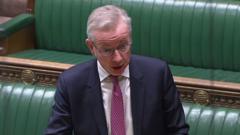1 hour ago
About sharing
Michael Gove has named five groups he said would be assessed against a new government definition of extremism.
The communities secretary told MPs he had concerns about the “Islamist orientation” of three of the organisations.
He also named two groups he said promoted a “Neo-Nazi ideology”.
The new extremism definition will apply to, but not criminalise, groups promoting an ideology based on “violence, hatred or intolerance”.
Groups meeting the new definition will be blocked from receiving government funding and meeting officials.
The run-up to the announcement has seen warnings from MPs and civil liberties groups about the definition, with warnings to the government not to use it to score political points.
Mr Gove argued the new definition was “more precise” than the existing one, which dates from 2011, and would help government efforts to tackle radicalisation.
He also argued the war between Israel and Hamas had led to “further polarisation” in society.
The community secretary has said a list of organisations meeting the new definition will be drawn up following “careful” reviews of evidence and consultation with civil servants.
His department has not set a precise date for unveiling the list of groups, which it is thought will still be weeks away.
But speaking in the Commons, he said the British National Socialist Movement and Patriotic Alternative would see their activities assessed against the new definition.
He said the groups “promote Neo-Nazi ideology” and were “precisely the type of groups about which we should be concerned”.
He also named the Muslim Association of Britain, Cage and MEND as organisations that “give rise to concern for their Islamist orientation and views”.
“We will be holding these, and other organisations, to account to assess if they meet our definition of extremism and will take action as appropriate,” he added.
He added it was important to be “precise in the use of language” when discussing Islamism, adding it “should not be confused with Islam”.
“Islam is a great faith, a religion of peace which provides spiritual nourishment to millions, inspires countless acts of charity and celebrates virtues of generosity, compassion and kindness,” he added.
“Islamism is a totalitarian ideology which seeks to divide, calls for the establishment of an Islamic state governed by sharia law and seeks the overthrow of liberal democratic principles”.
‘Permissive environment’
The new definition will define extremism as “the promotion or advancement of an ideology based on violence, hatred or intolerance, that aims to:
1. negate or destroy the fundamental rights and freedoms of others; or
2. undermine, overturn or replace the UK’s system of liberal parliamentary democracy and democratic rights; or
3. intentionally create a permissive environment for others to achieve the results in (1) or (2).”
Groups and individuals labelled extremist will have the right to seek reassessment and submit new evidence to a review.
If they still disagree, they can challenge the government’s decision through a judicial review of the decision.
Organisations or individuals added to the list will not be criminalised, unlike terrorist groups.
Alongside the redefinition, a new unit – the Counter-Extremism Centre of Excellence – has been set up, to gather intelligence and identify extremist groups.
Related Topics
3 days ago
1 day ago
